Ningbo wine import market not affected
- Details
- Category: Governmental News
- Published: Tuesday, 16 July 2013 16:29
The Ministry of Commerce announced on its official website on July 1 that the official investigations for anti-dumping and anti-subsidy for wine products imported from the European Union. With one week going by, Ningbo, which has the 3rd largest wine import port and the largest entity of imported wine market, shows no sign of being greatly affected. It is reported that some wine importers in Ningbo boast of adequate supplies and the new policy will not have a big impact in the short term.
Most wine business say they are confident as they have adequate stocks. The owner of a company engaged in French wine products said, compared to the prices of other products, that of the wine product has a large elasticity, so that even if the anti-dumping tax is imposed, its impact on the market will not be too large. One of the staff of Yongyu Imported Wine Center said that they had completed the bulk import from the EU as planned and they have an adequate inventory now. as the policy is still at the start-up stage, it will have little substantial impact on the current market, so the company has no intention and measures to change the prices so far.
It is reported that there are over 3000 brands from 24 countries that are imported to Ningbo Bonded Zone, among which only 60% is from the EU, while the others are from such emerging markets as Australia, New Zealand, Chile and South Africa. Affected by the differential tariffs, the proportion of imported wine from the EU has been on the decline in recent years. “Since last year, many importers have begun to adjust product structures. For example, some enterprises that used to doing business with French enterprises have turned to wine imports from New Zealand.” said the above-mentioned owner of wine company.
According to statistics from Ningbo Customs, from January to May this year, the cumulative amount of wine imports reaches 4.186 million liters, an increase of 1.7%. The value stands at $19.38 million, down by 14.1%. However, the imports from the major EU countries are declining. For example, imports from France, Italy and Spain respectively stand at 2.387 million liters, 463,000 liters and 362,000 liters, down by 5.5%, 35.7% and 62% respectively, indicating that the sources of imports have become diversified.








